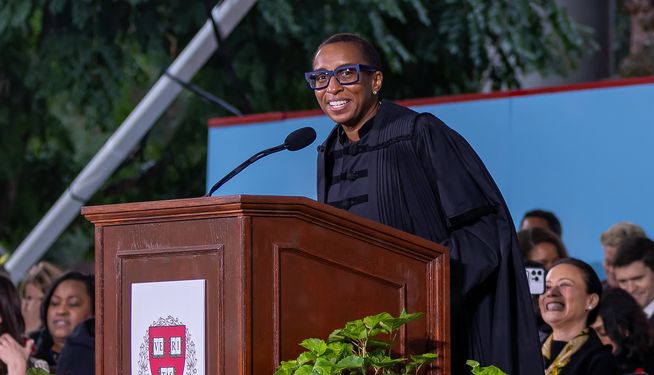By John F. Di Leo, Opinion Contributor
Claudine Gay is a nobody.
That’s not really an insult. This writer is a nobody, and not ashamed of it.
The world is full of nobodies.
Not everyone deserves to be in the history books; not everyone can found a global conglomerate; invent earthshaking inventions; write bestsellers or star in blockbuster films. The vast majority of people can only expect to be decent citizens; earning a living and providing for their families; serving their community as well as they can. And that’s an honorable life.
It gets disturbing, however, when someone is so bound and determined to matter in the world – to be a somebody – that he or she leaves ethics behind and pursues fame without regard for the rules.
And yes, these United States – and perhaps other modern countries, too – are increasingly populated by such manufactured somebodies, people who want to be the first to break some statistical but objectively unimportant glass ceiling. The first Hispanic congressman; the first black president; the first gay mayor; the first transvestite administrator of nuclear waste.
And when people pursue fame that way – from a desire to show up in some record book rather than a desire to honorably pursue an achievement one truly cares about doing well – something is likely to go wrong.
Claudine Gay was – briefly – the first black female president of Harvard University.
One wonders why anyone should care what color or sex a university president is. Since color and sex shouldn’t play a role in university policy decisions – other than ensuring there are enough men’s and women’s dorms for the next admission class, enough of each type of bathrooms in each building, and so forth – it shouldn’t matter what color and sex the president is.
But Claudine Gay didn’t know how to be “a good university president,” so she decided to be “the first black female president” – a more easily achievable target. That title doesn’t have any standards, just boxes to check off. She pursued that goal single-mindedly, and achieved it.
And then she made her biggest mistake: she let herself be televised, behaving offensively in the halls of Congress. All of a sudden, she became a story, and she started to be investigated. Long-buried stories were revived; long hidden sins became public. Her primary crime became national news: She was a fake.
At a university once globally respected for research, originality, serious academic thought, it was revealed that the president had been granted a doctorate for sloppily and sneakily lifted work. It was revealed that she had done so not once, but several times, at least, and had never been punished for it. In fact, the board knew her to be a plagiarist and promoted her anyway, eventually making her president. She achieved her goal, which was always the statistical award, not genuine academic achievement.
The first lesson, therefore, is that one should pursue a career out of respect for that career, not because it might be an easy way to chalk up some recognition. If you break some rules on the way up, you’re going to eventually be exposed, and have no genuine accomplishments with which to redeem yourself.
But that’s not the most important lesson about the Claudine Gay story. In fact, the most important lesson here isn’t even about education.
Claudine Gay committed the sin of plagiarism in academic papers – an academic crime, certainly, but not the kind of crime that lands one in jail. She wasn’t punished for it; she got to keep her bachelors, her masters, and her doctorate. She didn’t lose her job; she got promoted, eventually rising to the absolute pinnacle: the presidency of one of the most reputable universities in the country.
And what have we learned from the explosion of stories about her in recent weeks? That she didn’t commit plagiarism once, or twice, or three times. Not even ten or fifteen times.
We now know that – while she kept being rewarded for her misbehavior – she kept on committing the same crime.
Due to this lack of deterrence – some would even argue she received a steady stream of encouragement, in fact – she continued to do it. She plagiarizes academic papers like Joe Biden plagiarizes speeches, with regularity and impunity.
This is the lesson that America needs to learn: When a person isn’t punished for a crime, that person will repeat the crime, again and again, forever.
There’s a reward to crime. In Claudine Gay’s case, it was the head office at Harvard. For a carjacker, it’s the couple thousand bucks the chop shop pays for the vehicle. For a gang boss, it’s the money, drugs and babes. For a politician, it’s the power – and often, too, the money, drugs and babes.
Corruption runs rampant in America. We refuse to punish carjackers, so we get tens of thousands of carjackings. We refuse to punish border gate crashers, so we have millions of illegal aliens, destroying our schools and neighborhoods, burning through our welfare and police budgets. We refuse to punish politicians who take bribes and violate their oaths of office, so we have trillions of wasted tax dollars, and an unrestricted bureaucracy so dictatorial that it has driven our manufacturing sector to foreign shores.
This may sound like a leap at first, but it’s not. When crimes are not punished, the criminals will repeat the crimes, as often as they can, no matter what the crime is.
We don’t even know how many crimes there are – it’s impossible to keep track. The small crimes don’t all get reported, and the big crimes are so big we forget that they are actually crimes.
But when the EPA violates its congressional charter and puts hundreds of American manufacturers out of business, that regulatory overreach is itself a crime. We don’t punish the EPA for it so we forget that it’s a crime, but all those tens of thousands of jobs that have disappeared, all those billions of dollars in lost potential salaries (and tax revenues!) are the result of a crime. A crime that we refused to prosecute.
Similarly, when Congress or the White House violates their oath of office to obey the Constitution, and they pass illegal laws and sign illegal executive orders, the tens of thousands of people who lose their jobs as a result are also the result of a crime. Remember the tens of thousands of workers on the Keystone Pipeline, for example, unemployed or even bankrupted by Joe Biden’s January 2021 executive orders? They lost their jobs because of Biden’s illegal executive action. He wasn’t impeached for it; Congressmen even collected fundraising dollars celebrating the devastation.
We don’t punish crimes enough. We could, and we should, but we don’t.
It’s not that hard. Think of how good we all feel today, knowing that this pompous, anti-semitic plagiarizer-in-chief at Harvard has suffered the national embarrassment of being thrown out of office. We are right to be happy to see at least some measure of justice done.
And just imagine, how much more so, if we could see the same justice applied to all the other, infinitely more serious crimes that our government class winks at and encourages, whether committed by locals or by foreigners, whether committed in our capitols or in our bureaucracies.
Let the crimes go unpunished, and you will only get more crime. Let the border go unguarded, and you will only get more border jumpers. Let government break free of its bonds, and overtax, overregulate, and overdo, and it will, again and again, until there’s nothing left but a shell of what was once a proud nation.
The jettisoning of Claudine Gay was an inspiring way to begin this election year. We pray to Divine Providence that it be the beginning of a trend, to finally see a return to the rule of law, from academia to pop culture, from the media to the government.
America is teetering on a precipice; nothing less than such a change can save us.
Copyright 2024 John F. Di Leo
John F. Di Leo is a Chicagoland-based trade compliance trainer and transportation manager, writer, and actor. Once a County Chairman of the Milwaukee County Republican Party in the 1990s, after serving as president of the Ethnic American Council in the 1980s, he has been writing regularly for Illinois Review since 2009. Follow John F. Di Leo on Facebook, Twitter, Gettr or TruthSocial.
A collection of John’s Illinois Review articles about vote fraud, “The Tales of Little Pavel,” and his 2021 political satirical discourses about current events, “Evening Soup with Basement Joe,” Volumes One, Two, and Three, are available in either paperback or eBook, only on Amazon.
Don’t miss an article! Register for Illinois Review’s free email notification service, so you always know when IR produces new content!








